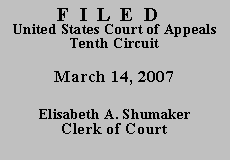

UNITED STATES OF AMERICA,
After examining the briefs and appellate record, this panel has determined
unanimously that oral argument would not materially assist the determination of
this appeal. See Fed. R. App. P. 34(a)(2); 10th Cir. R. 34.1(G). The case is
therefore ordered submitted without oral argument.
Francisco Pastrana-Escalante (Pastrana-Escalante), a citizen of Mexico, appeals from a guideline sentence. He claims the district court abused its discretion by failing to grant a downward departure based on cultural assimilation and other mitigating factors. As a result, Pastrana-Escalante contends he received a disproportional sentence compared to similarly situated defendants. Additionally, Pastrana-Escalante claims his counsel was ineffective for failing to present all mitigating circumstances and properly arguing for a lower sentence. Because the district court unambiguously stated it had discretion to grant the requested downward departure but declined to do so, we lack jurisdiction over that claim and dismiss it. Furthermore, we decline to address Pastrana-Escalante's ineffective assistance of counsel claim.
I. Background
On August 5, 2005, Pastrana-Escalante pled guilty to illegal reentry after deportation subsequent to an aggravated felony conviction (conspiracy to deliver marijuana) in violation of 8 U.S.C. § 1326(a) and (b)(2). Pastrana-Escalante's presentence report (PSR), prepared using the 2004 edition of the United States Sentencing Commission's Guidelines Manual, determined his total offense level was 21 and his criminal history category was III, resulting in a guideline range of 46-57 months. Prior to sentencing, Pastrana-Escalante filed a Motion for Downward Departure asking the district court to sentence him below the guideline range because he waived his right to a deportation proceeding. Attached to his motion was his Sentencing Statement which asked the district court to sentence him to 18 months imprisonment based on the sentencing factors set forth in 18 U.S.C. § 3553(a).(1)
At sentencing, Pastrana-Escalante presented letters from his family and friends, offered mitigating evidence based on his cultural assimilation within the United States and testified, along with his sister and father, on his own behalf. After hearing the government's objections to Pastrana-Escalante's motion for downward departure, the district court concluded Pastrana-Escalante should be sentenced to a term of imprisonment within the advisory guideline range and sentenced him to 46 months. In doing so, the district court acknowledged its jurisdiction to depart downward but declined to do so. Furthermore, the district court noted it consulted the guidelines for advisory purposes only and considered the sentencing factors found in 18 U.S.C. § 3553(a)(1)-(7).
II. Discussion
Pastrana-Escalante argues the district court was unaware that cultural assimilation is a mitigating factor a court can take into consideration in deciding whether to depart downward. He claims the court's misunderstanding and resulting failure to grant a downward departure caused him to receive an unfair sentence outside of the range of sentences for similarly situated defendants.
We lack jurisdiction "to review a district court's discretionary decision to deny a motion for downward departure on the ground that a defendant's circumstances do not warrant the departure." United States v. Sierra-Castillo, 405 F.3d 932, 936 (10th Cir. 2005). We review a denial of a downward departure only if the denial is based on the sentencing court's interpretation of the guidelines as depriving it of the legal authority to grant the departure. United States v. Fortier, 180 F.3d 1217, 1231 (10th Cir. 1999). "A district court is presumed to understand that it has discretion to downwardly depart unless the court unambiguously states that it lacks such discretion." Sierra-Castillo, 405 F.3d at 936. Here, the district court clearly and unambiguously stated it could depart downward, but declined to do so.(2) Therefore, we lack jurisdiction to review the district court's decision to deny Pastrana-Escalante's motion for downward departure. Id.
While we lack jurisdiction to review a district court's discretionary refusal to depart downward, we have jurisdiction to review any sentence for reasonableness. United States v. Chavez-Diaz, 444 F.3d 1223, 1229 (10th Cir. 2006). However, Pastrana-Escalante's brief did not raise this issue on appeal. He challenges only the denial of a downward departure rather than challenging the reasonableness of his sentence. United States v. Fonseca, 473 F.3d 1109, 1112 n.3 (10th Cir. 2007).
We decline to consider Pastrana-Escalante's ineffective assistance of counsel claims. Pastrana-Escalante may pursue an ineffective assistance of counsel claim in a collateral proceeding under 28 U.S.C. § 2255. See United States v. Galloway, 56 F.3d 1239, 1240 (10th Cir. 1995) (en banc) ("[Ineffective assistance] claims brought on direct appeal are presumptively dismissible, and virtually all will be dismissed.").
We DISMISS Pastrana-Escalante's appeal.
Entered by the Court:
Terrence L. O'Brien
United States Circuit Judge
1. The motion and sentencing statement were later amended without substantive changes.
2. The district court stated: "I acknowledge for the record that I have jurisdiction to depart downward. I decline to exercise that jurisdiction." (R. Appellant App. at 33).